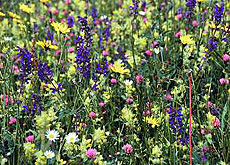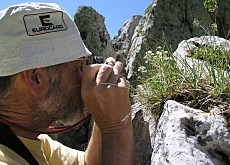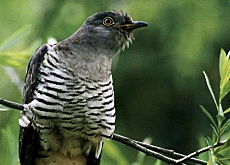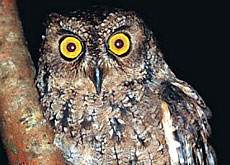Concern grows over threatened biodiversity

Switzerland is almost top of the world charts when it comes to flora and fauna threatened with extinction, according to criticism voiced on International Biodiversity Day.
Two non-governmental organisations, WWF Switzerland and Pro Natura, believe that it is high time that the Swiss government acts to preserve biodiversity.
Pro Natura’s Urs Tester told swissinfo that the number of endangered plants, birds, fish and other animals in Switzerland was simply astonishing.
“About half of the country’s flora and fauna are endangered or threatened with extinction,” Tester revealed.
The animals that are at greatest risk in Switzerland are amphibians, like the tree frog, and reptiles that inhabit freshwater habitats, such as the viperine snake, dice snake or European pond terrapin.
Last year, the Federal Environment Office said that the decline in Swiss biodiversity had been halted, although the situation still remained precarious.
In June 2006 it presented the first overview of the Swiss Biodiversity Monitoring programme, with data collected over five years.
Tester, however, disputes the government line. He says there has been a dramatic decrease in a number of species.
“One development that really worries us is the amphibian population. There are certain species which are endangered and their numbers have dropped by at least half in the past 20 years,” Tester said.
Kurt Eichenberger of WWF Switzerland told swissinfo that the heart of the problem lies in a lack of political strategy.
“We don’t have a biodiversity strategy so we don’t know exactly in which direction we should go. We have very good instruments in place but we are not good at putting things into force,” Eichenberger explained.
As to why this was the case, Eichenberger’s view was that biodiversity was not a compelling enough topic for either the Swiss parliament or the public.
“The government should do much more in public relations to make it understandable why we need biodiversity and what will go wrong if we don’t stop this loss of biodiversity,” he emphasized.
Reversal of fortune
In June last year, the director of the Environment Office, Bruno Oberle, told swissinfo that he was confident that Switzerland would be able to reverse the decline in biodiversity by 2010.
This was an objective set at the Johannesburg Earth Summit in 2002 to which Switzerland, among many other countries, committed itself.
Tester, though, is sceptical that it will reach this goal.
“With so many endangered species, there is little chance of Switzerland meeting its target if it continues like this. It’s not only Pro Natura, which is saying this. Even the Organisation for Economic Cooperation and Development says that Switzerland is doing too little,” he said.
The World Conservation Union (IUCN) revealed on Tuesday that about 15 per cent of Europe’s mammals are endangered.
The IUCN said human impact on the environment, such as deforestation, wetland drainage, pollution and over-harvesting, was the main reason why mammals are under threat.
swissinfo, Faryal Mirza
Biological diversity, or biodiversity, is the number of species – animals, plants and microorganisms – found in a certain area. The concept also includes the genetic variability of these species, since no organism is absolutely identical to any other. Biodiversity also covers the variety of communities in which these species live.
The rapid decline in biodiversity worldwide is largely due to human activities: urbanisation and intensive agriculture.
At the Earth Summit in Rio in 1992, world leaders set targets to save the planet from species extinction with the Convention on Biological Diversity – a non-binding treaty which sets out goals, policies and general obligations.
Ten years later at the Johannesburg Earth Summit, they agreed to try to reverse the decline by 2010.
Scientists estimate that between ten and 100 million plant and animal species now exist on the planet.
According to the World Conservation Union (IUCN), 27,000 species disappear worldwide every year and 24 per cent of mammal and 12 per cent of bird species are now critically endangered.
The Swiss signed the United Nations convention on biodiversity in 1994.

In compliance with the JTI standards
More: SWI swissinfo.ch certified by the Journalism Trust Initiative



You can find an overview of ongoing debates with our journalists here. Please join us!
If you want to start a conversation about a topic raised in this article or want to report factual errors, email us at english@swissinfo.ch.